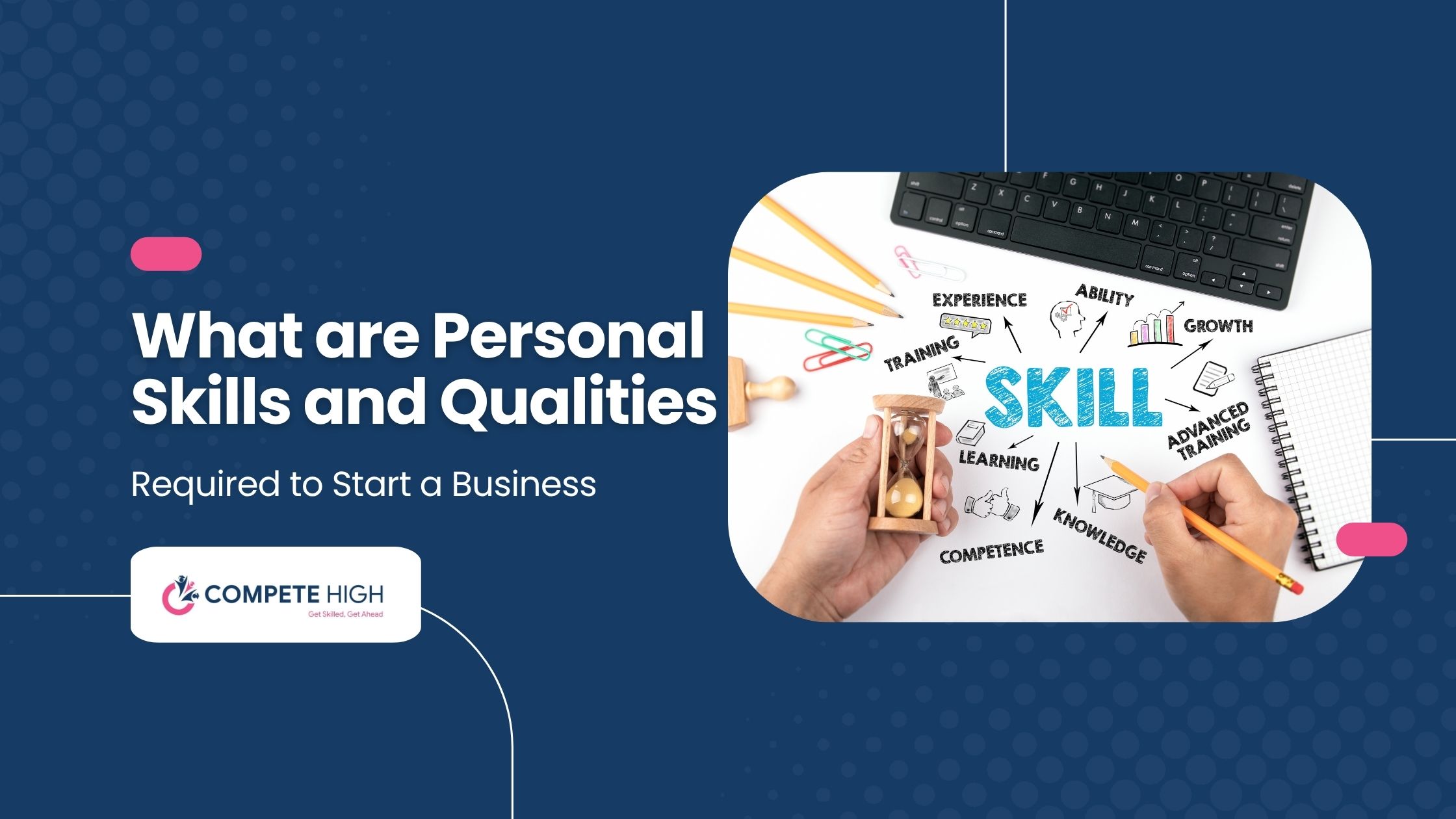
Understanding Why Personal Traits Matter for Business Success
Launching a company goes way beyond having a cool idea or enough cash to rent an office. Those two pieces help, no doubt, but neither tells the whole story. Deep inside every winning business sits something harder to see: your own character.
Whether you plan to open a bakery, run an online coaching gig, or grow a tech start-up, the skills and habits you bring will often decide if you quit early or stick it out. Talk to any veteran business owner, and they'll tell you the same: your mindset counts as much as your pricing plan. Whether you're highlighting your personal skills for CV preparation or reviewing your list of skills and qualities before launching a venture, understanding both personal and professional skills is crucial.
The following sections will delve into the importance of personal traits, the common challenges faced by new founders, and how cultivating a positive mindset lays the groundwork for years of success. Along the way, we'll touch on relevant skills and attributes, outline skills and qualities examples, and explore both personal skills examples and professional skills examples that can help turn your vision into a long-term reality. Developing the right blend from your skills and qualities list is often the edge that sets enduring entrepreneurs apart.
Why Personal Traits Matter in Entrepreneurship
Many people think that launching a business is really all about skill or a big list of contacts. Those items help, no doubt, yet neither will pull you through lean weeks, sudden curveballs, or the long nights when you are teaching yourself how to do everything. For anyone drafting personal resumes or considering skills and qualities for a CV, it's worth asking: what are personal skills, and what are professional skills?
Entrepreneurs must learn to be self-starters. Nobody shows up to assign tasks or remind you of deadlines. Instead, you choose what gets done, fix problems, pitch your idea, handle no thanks, and do it all before lunch some days. Personal and professional skills such as grit, initiative, clear talk, and calm nerves under pressure matter most then. These are not just professional strengths, they are classic examples of skills and qualities seen in successful founders. From skills and qualities CV tips to real-world skills and qualities examples, building your capacity in these areas—whether labeled as cv skills and qualities or cv personal skills—can define your ability to stay the course.
Picture this: Two founders launch the same venture with the same funds, tools, and advice. One accelerates while the other drifts to a stop. The difference often rests on who handles setbacks, learns fast, keeps sight of the goal, and adjusts course. Winning in business is not just about action – it is about mindset, response, and steady doing.
Common Challenges Entrepreneurs Face Early On
When you launch your own venture, you learn fast that hat piles up quickly. For a while, you design the product, write ads, crunch numbers, help customers, and plot strategy, all before lunch. Because no one else is on the payroll, every choice you make ripples across the entire startup. That’s when personal skills for resume writing start to become real-life necessities, not just buzzwords. From examples of professional skills like time management and budgeting to personal attributes for a job such as adaptability and perseverance, every task tests your limits.
Entrepreneurs often display a wide range of skills and attributes examples, showcasing both professional skills for resume and personal qualities for CV success. These include a strong personal skill set and a clear list of professional skills that touch every part of the business. Even when preparing a CV, knowing the right blend of skills and qualities for CV impact—like leadership or attention to detail—can make a big difference. These personal skills and qualities aren’t just filler; they’re practical assets. Whether you're crafting your professional skills for CV, listing personal attributes for CV, or selecting an example of skills of a person, running a startup means you’ll live them daily.
Here are a few hurdles that show up early for most new founders:
- Uncertainty and risk: There is no steady pay cheque and no proven roadmap. You step into the dark and begin your own trial-and-error adventure.
- Self-doubt: Trying something brand-new can stir imposter feelings that whisper, 'Who do I think I am?'
- Overwhelm: With dozens of tasks screaming for attention and only 24 hours to split between them, mastering time management turns into a survival skill.
- Loneliness: Without a co-founder or close circle of mentors, the early grind can feel like shouting into an empty room.
- Financial pressure: Many builders are bootstrapping, pushing profits back into the company while still covering groceries and rent.
Working through these roadblocks takes sturdy emotions, grit, and a clear sense of why you started, not just tidy plans or spreadsheets.
Self-Awareness: The Starting Point for Any Entrepreneur
Before we dive into traits that matter, let's spotlight the quiet powerhouse: self-awareness.
Knowing what you do well and where you trip up is a game changer for any business.
It lets you:
- Spend more time in your sweet spot and hand off the busy work.
- Spot warning signs early so you quit repeating the same blunders.
- Keep an honest picture of yourself when stress tries to distort it.
Self-aware owners don't just fly off the handle – they pause and think. They realise if fear or pride is driving their next move and pull back if needed. They can also say, 'This isn't working,' and pick up the pieces without crumbling.
One solid habit to build that self-knowledge is journaling. Just ten minutes each evening asking:
- What went well today?
- What threw me off?
- What can I nail better tomorrow?
Do that long enough, and your emotional smarts grow, which shows in smoother decisions and a healthier bottom line.
Keeping the Right Mindset: Grow Instead of Perfect
Business is messy. Things break. Plans fall apart. Clients ghost you. Algorithms change overnight. Rivals pop up where you least expect them. The founders who stick around and shine aren't the ones who nail every detail. They are the ones who notice, learn, adjust, and rebound fast. This kind of resilience reflects some of the most good personal skills and personality skills that hiring managers also look for in a strong personal skills CV. Whether you're reviewing your work skills for CV relevance or identifying traits from your list of personal skills, the ability to adapt is key.
This is where the growth mindset comes in. The term was made popular by psychologist Carol Dweck and refers to the idea that you can boost your skills and smarts through hard work, lessons, and grit. That view differs sharply from a fixed mindset, which holds that talent is something you're born with and can never change. Understanding what is personal skills and what is professional skills helps frame this concept. Those who embrace growth tend to develop a rich personal skills list and strengthen their professional skills list over time.
This mindset nurtures professionalism skills and supports the kind of examples of personal skills that go beyond theory—ones you'll want to include when thinking about skills.for CV, personal skills definition, or even showcasing personal qualities CV achievements.
Entrepreneurs who embrace a growth mindset:
- Treat setbacks as helpful notes rather than knockouts.
- See tough tasks as chances to stretch.
- Prefer steady progress over flawless results.
- Are you okay with starting small and learning in public?
When you swap the thought 'I'm just not good at this' with 'I'm learning how to improve', you speed up your growth and build the mental toughness every founder needs to ride the business roller coaster.
Why Emotional Resilience Is Non-Negotiable
Let's be real – starting a company is an emotional ride. The highs can send you dancing, but the lows may feel like a gut punch. What typically keeps some people moving forward while others quit isn't smarts or deep pockets; it's resilience.
Real resilience doesn't mean shoving feelings aside or pretending everything is peachy. It means noticing what you feel, allowing yourself time to sit with it, and then deciding to take the next step anyway.
It looks and feels like:
- Sending out another pitch after ten polite no-thanks.
- Rebuilding a campaign that tanked last month.
- Showing up when hiding under the covers feels safer.
- Asking for help when your pride screams, 'Do it alone.'
Once you think of resilience as a muscle, you see it can actually grow stronger; every strain makes you a bit more ready for what comes next.
Every Aspiring Entrepreneur Needs These Core Personal Skills
Starting and running a business takes more than big dreams and late nights – you also need a sturdy set of everyday habits that power day-to-day work. These aren't just buzzwords you circle on a job application; they're the unnoticed routines that decide whether you meet deadlines, learn from mistakes, and guide your team with clear direction. They reflect personal skills and attributes that matter deeply in any venture and are exactly the kind of personal skills in CV sections that stand out to potential partners or employers.
Understanding what is a professional skill helps you appreciate how these habits connect to leadership and accountability. Many of these routines can be identified as both personal qualities and skills and key entries in your professional skills CV. From showing up consistently to managing pressure, these traits are solid qualities for resume writing and form part of a strong list of key skills for a CV. Entrepreneurs who develop the right mix of skills and personal attributes are often better positioned to lead and succeed.
Below are the key personal skills every newcomer should polish and a quick look at how each one helps your venture last hush.
1. Communication Skills
Business is really about people – customers, partners, investors, suppliers, and teammates. If you can't share your idea in plain terms, steer a tough talk, or write a friendly email, you'll struggle to build trust and get people on your side.
Verbal Communication
Whether you're pitching an idea to investors or calming an upset customer, the way you speak matters. Entrepreneurs must:
- Break down tough ideas so anyone can grasp them.
- Speak with confidence in meetings, interviews, or on stage.
- Listen closely and reply with genuine empathy.
Written Communication
Emails, proposals, landing pages, and product descriptions all demand clear, purposeful writing. Sloppy grammar or foggy wording can kill your credibility in a heartbeat.
Digital Presence
The tone you use on social media, how you reply to reviews, and even the words in your bio shape your brand. Strong, steady communication ties every touchpoint together.
2. Decision-Making and Problem-Solving
Entrepreneurs face dozens of choices every day, often under pressure and with half-finished facts. Some calls, like picking a new app, feel minor; others can steer the company's course.
Good decision-making rests on the following:
- Clarity: Keep your goals in sight and let them light the way.
- Speed: Sidestep paralysis when time is shrinking.
- Risk awareness: Blend gut instinct with reason and know what happens if you wait.
Problem-solving is equally important. Delays, software crashes, and surprise rival bumps will show up, and your calm hunt for answers keeps the wheels turning.
Real entrepreneurs cannot sit around hoping someone else will handle a mess. You quickly become the go-to person, so train your mind to ask, 'How do I fix this?' instead of, 'Why me?'
3. Time Management and Self-Discipline
In a new venture, you may juggle everything – designing the product, crafting ads, answering emails, juggling paperwork, and more. Without a clocking-in boss or clear shift, self-discipline quickly becomes your secret weapon.
Mastering Time Management
Being organised with time is not about looking busy; it is about getting real results. To stay on track, you must:
- Pick high-impact work that drives growth, not just what blinks red on your screen.
- Guard your focus by limiting multitasking and putting phones or alerts on pause.
- Lean on simple systems lists, batching similar jobs, or the Pomodoro timer to steer your day.
Practising Discipline
Some days, your drive will vanish (trust me, a lot of days will). On those days, discipline drags you to the keyboard, the phone, or the workbench. It's the choice to write a blog post even when your eyelids are heavy, to chase that lead again after a polite no, and to wrap up a task even if the only audience is you.
Discipline isn't sexy. Yet, over time, it turns ordinary people into steady-makers and weeds out folks who fade before the finish line.
4. Financial Responsibility and Basic Money Management
You don't need a CPA badge to run a small business, yet zero money sense will sink you fast. Too many newbies blur the line between personal wallets and company books and then wonder why they run out of cash.
Playing it smart means planning, holding back when the urge to splurge hits, and always keeping your eyes on the numbers.
Key skills here include:
- Budgeting: Planning how much to spend and where to allocate resources
- Tracking expenses: Knowing where your money goes so you can make informed adjustments
- Understanding cash flow: The timing of money in vs. out and how it affects daily operations
- Pricing your product or service: Based on value, costs, and market demand – not guesswork.
A savvy entrepreneur steers clear of needless debt, picks investments with care, and never prays for good luck to stay in business. You don't need to know everything with enough sense and discipline to keep your company on course.
Sales and Persuasion Skills
You might be the most excited and inventive founder around, but without sales, your idea stays a hobby.
Selling isn't trickery; it's figuring out what people want and showing them why your product makes life easier. Whether you are chatting with a customer, pitching an investor, or bringing on a new teammate, you are always in a sales conversation.
Key elements of effective persuasion:
- Confidence: When you trust your offering, others catch the vibe.
- Listening: Top sellers spend more time hearing than talking.
- Framing: Word things so benefits shine and problems fade.
- Handling Objections: A 'no' often means Tell me more, now that I'm out.
Business owners who get this gain command over money and freedom. Instead of crossing their fingers for marketing or a viral post, they hunt leads, close deals, and build the future they want.
Key Entrepreneurial Traits That Set You Apart
Knowing how to do tasks is useful, but your core character is what really decides how you handle the wild ups and downs of business. These traits don't just help you launch a company; they push you forward when the road turns rough, quiet, or hard to see.
Let's look at the key qualities that keep you thriving over the long haul.
1. Passion and Purpose
Some mornings, you'll wake up feeling worn out, down, or full of second thoughts. When that happens, clever tricks or new apps won't carry you forward deeper. Have to pull you up.
A clear purpose gives you something larger than money to cling to. It can be:
- Fixing a problem you once lived through.
- Opening doors to fresh freedom for your household.
- Leaving the planet or your community better than you found it.
Passion keeps your energy high and your heart in the work. It's not just surface hype; it's a real belief that what you're doing counts.
Entrepreneurs who lead with purpose are far more likely to ride out storms, learn fast from stumbles, and rally a team or audience that shares their vision.
2. Confidence and Risk Tolerance
Starting a new business puts you on an unpaved road with no guardrails, so you need to believe in yourself when the way ahead looks blurry. That quiet, steady belief – certain nothing is promised – sets the stage for every choice you will make.
Confidence isn't bragging or pretending you understand every line of the business plan. It's knowing you can learn, fix problems, and steer the ship even when the map runs out.
Your willingness to carry a notebook full of rough drafts while the final copy is still overdue sits right next to that confidence. You don't need to gamble wildly, but you do have to be:
- Okay with deciding when the whole picture is still fuzzy.
- Ready to spend time and a little cash on ideas that may flop.
- Open to testing, crashing, and reworking things fast.
Because confidence isn't glued in place, it rises each time you show up, take a swing, and come away still standing. Every small win adds weight to your momentum.
3. Creativity and Innovation
Today's marketplace is so packed that normal ideas drift off the shelf, which is why a bit of creativity becomes your loudest voice. You don't need a paintbrush or a guitar; you simply have to:
- Unearth fresh answers for problems that keep popping up.
- Face obstacles with curiosity instead of panic.
- See empty corners of the market other people keep missing.
Innovation can show up as a fresh business model, a witty marketing stunt, or just a smarter way to help customers. Entrepreneurs who keep testing ideas tend to build companies that last and can grow.
Creativity also gives you the room to pivot when something fails – it turns a setback into a new path instead of a dead end.
4. Perseverance and Patience
Most so-called overnight hits spent years in the shadows. Regardless of what social media shows, building a meaningful business takes time. And not just clock hours – it demands grit during the boring, tough, and soul-draining stretches.
Perseverance means:
- Following through even when progress crawls.
- Learning from rejection instead of letting it bruise your ego.
- Showing up day after day – not only when the muse strikes.
Patience matters just as much. We live in a culture that loves quick wins, yet real companies often need several seasons of steady work before they find their groove.
Being patient doesn't mean sitting still. It means trusting the plan, cheering for tiny victories, and remembering that growth moves in waves, not neat, straight lines.
5. Leadership and Accountability
Even if you're running your business alone today, you still lead everything from your brand and customer ties to the dream that keeps you awake at night. With more sales and more demand, you'll soon direct a small crew, freelancers, or helpful partners.
Real leadership means owning every outcome, good or bad. That looks like:
- Setting clear goals and standards.
- Communicating with integrity.
- Being the first to admit mistakes and the first to fix them.
Holding yourself accountable earns trust, first from others and then from you. When you keep quiet promises – whether I'm launching my product next month or I'll update the website this week – your faith in your skills grows stronger.
An effective leader also knows when to hand off work, how to fire up teammates, and how to keep everyone's steering wheels or screen readers moving toward the same purpose, whether that team has ten people or just you and a laptop.
Developing and Honing Your Entrepreneurial Skills
Most beginners don't come loaded with every business skill or the right attitude – and that really is okay. Top owners didn't show up with all the answers packed in their bags. What set them apart was a plain willingness to learn. They spotted gaps in their knowledge and then chipped away at those gaps every day. You can do the very same thing.
In this last section, we will walk through practical ways for you to build the skills and traits we've talked about, no matter where you begin.
1. Identifying Your Strengths and Weaknesses
Before you can move forward, you have to see where you really are. That clear view starts with a simple self-check.
Try asking yourself:
- What tasks feel easy and even fun?
- Which ones do I dodge or sweat over?
- When do I finish the day buzzing or totally spent?
You can pencil answers in a notebook, use a quick online quiz, or simply chat with an honest mentor. Those notes will help you spot patterns in group work, part-time jobs, or side projects. The point isn't to label yourself as good or bad but to lay down a starting line.
Once you know your highs and lows, you can play to your strengths and set a steady plan for the areas that need work.
2. Learning Through Experience
Entrepreneurship is one of the few fields where getting your hands dirty teaches you far more than any class or textbook ever will.
Want to sharpen your selling skills? Offer a product or service to friends, neighbours, or a local market. Need to polish your communication? Post updates, send short emails, or launch a simple blog. Unsure how money flows? Track every dollar, then play with easy budgeting apps or spreadsheets.
You don't have to wait until you feel ready. Holding back usually just dresses fear in polite clothes. Jumping in, even with a tiny side project, gives you a messy, honest experience and starts building the grit, knowledge, and confidence you must keep.
3. Committing to Continuous Learning
Successful entrepreneurs never shut the book on education. They stay curious, ask why, and welcome fresh ideas – especially when a plan unravels.
To stay ahead:
- Read biographies, industry blogs, or the latest business releases regularly.
- Take quick online courses or sign up for a lunchtime workshop.
- Listen to podcasts or grab interviews with seasoned founders.
- Join forums or local meet-ups where members swap tips and resources.
Treat your learning like a key business task, not a random hobby you do when you have spare time. Block off a set chunk each week – even just thirty minutes a day – and let that time stack up until it turns into noticeable growth.
And keep in mind that every new lesson also toughens your attitude.
4. Building a Support System
Running a business doesn't need to feel like a solo road trip. Filling your circle with folks who get your ups and downs can be one of the smartest moves you can make.
Look for:
- Mentors: Veterans who have reached your dream destination and are willing to share the shortcuts and potholes.
- Accountability partners: Fellow entrepreneurs who ping you about deadlines and track the numbers with you.
- Mastermind groups: Tight-knit crews where everyone pushes, brainstorms, and celebrates breakthroughs together.
- Online communities: Forums, Facebook groups, or Slack channels filled with people from your field or local scene.
A sturdy support system gives you a safe place to vent problems, cheer over wins, and gain fresh angles when doubt creeps in.
5. Making Personal Growth Part of Your Business Plan
It's easy to pour all your energy into marketing, product tweaks, and sales goals, but your own growth needs a seat at the strategy table, too. Your venture can't outpace you, so treat learning, habits, and mindset upgrades like the fuel that keeps the whole engine running.
Try weaving these habits into your routine:
- Set small personal targets beside the big business ones.
- Jot down thoughts so you can see wins, misses, and shifts in attitude.
- Do short mindfulness breaks or any mood-boosting ritual so stress bounces off you.
- Look back each month at lessons learnt, gains scored, and blockers still lurking.
Stop treating self-growth like a weekend hobby: make it a main support beam of success. The steadier, clearer, and calmer you are, the smarter choices you make and the stronger the leader you show up as.
Final Thoughts
Starting a business is as much an inner trip as it is a grind outside. You wrestle with self-doubt, gamble on bold choices, and often stumble through every twist; your own smarts and grit will be the hammer that keeps the frame from falling.
The bright side? Perfection is not on the checklist. You only need to show up, learn from scars, and keep moving; it's easier said than done, but it is crucial on rough mornings.
Begin with what you already own. Polish the skills still hiding. And remember, the player you grow into while building the company is just as priceless as the company itself.
Ready to jump? Your adventure won't kick off with a thick business plan; it starts with the first step you take.










